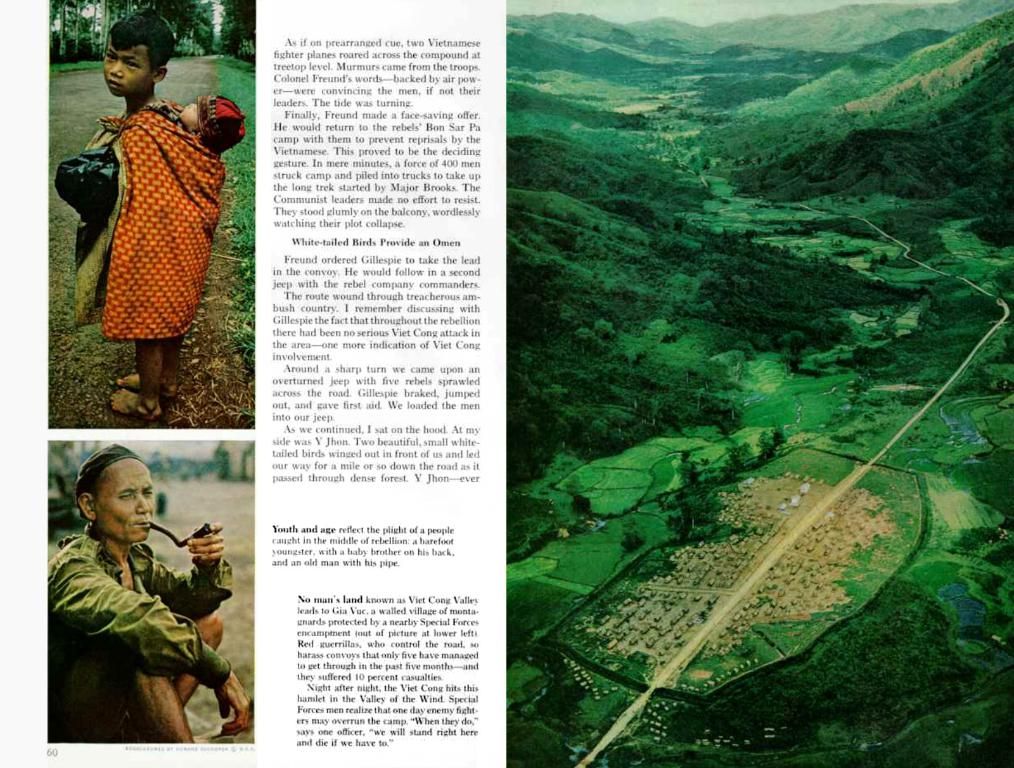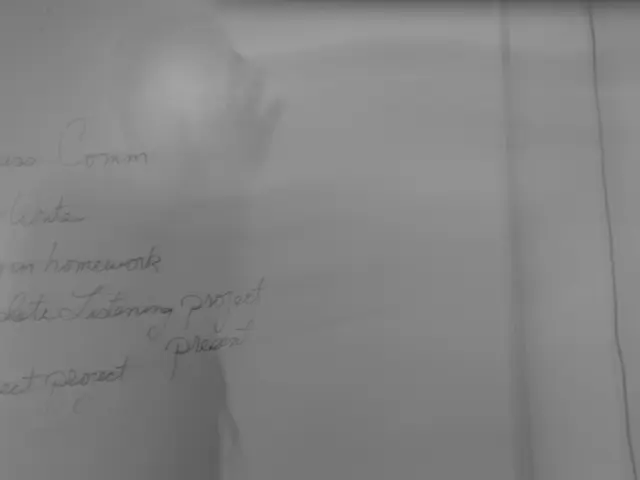Nine Significant Factors Shaping Political Views: Major Influences and Their Effects
# Politically Speaking: The Factors That Shape Our Opinions
Every political junkie worth their salt knows that understanding the sources of our political views is key to deciphering the ever-changing landscape of modern democracies. So, let's dive into the nitty-gritty of what shapes our opinions, leaving no stone unturned.
The Family That Politics Together...
...stands a better chance of influencing the political leanings of its offspring. Growing up in a family where political conversations are a dime a dozen, you're likely to adopt the beliefs and party affiliations of your elders, setting you on a path that's mostly paved by parents and grandparents. But, as you branch out and experience life beyond the family unit, the influence of your folks may start to wane, though it never completely fades.
Schooled in Political Ideology
Education plays a pivotal role in shaping our political views. Think about it: schools and universities expose us to a diverse array of political ideas, theories, and debates that challenge us to think critically about the world around us. Higher education nurtures curiosity and encourages us to question everything, potentially leading us to reassess our political beliefs. Bookworms, lecture-lovers, and academic die-hards, welcome to the club.
Peer Pressure, and Not Just About Haircuts
As you leave the family homestead, your peer group and social networks become crucial players in your political socialization. These groups can either reinforce or challenge the beliefs you've picked up so far. In a quest for social acceptance, you might find yourself swaying to the political tunes that ring loudest among your pals. And, let's not forget the role that social media plays in disseminating political information and opinion. Take a good look at your digital footprint, and chances are, you'll find it's a reflection of your political preferences.
That's So Media
The media is a powerful force in shaping public opinion. Whether it's TV, newspapers, online platforms, or social media, they all play their part in feeding us information and shaping political discourse. The way news is framed, the selection of topics, and the biases of particular media outlets can all sway your opinion. Oh, and remember the rise of digital media and echo chambers? Yeah, they've only intensified the media's role in political socialization.
Pockets Speak Louder Than Words
Economic conditions and occupational environments can have a mighty impact on our political beliefs. Unexpectedly losing your job or navigating tough financial times can send you scurrying toward political parties or ideologies promising an economic revival. And your occupation can influence your political leanings in other ways too – blue-collar workers, business owners, and professionals all have distinct political priorities based on their economic interests.
Life Happens
Personal experiences and major life events can radically transform your political beliefs. Think about it: for some, serving in the military has instilled a strong sense of patriotism, while for others, interacting with diverse cultures has fostered a commitment to social justice. National and international events can also leave lasting impressions, prompting significant shifts in political attitudes. They say life is what happens when you're making other plans – it's a good thing we pay attention!
Taking Stock: It's Complicated
For many, family and upbringing are the bedrock upon which political beliefs are formed, setting the initial trajectory. As we grow, however, factors such as education, peer groups, media exposure, and personal experiences grow more influential. In our contemporary society, media and social networks are increasingly prominent players in political socialization, shaping the way we think in an era dominated by online information consumption.
Ultimately, the sources that most powerfully influence our political beliefs are those that resonate with our experiences and align with our worldview. A complex interplay of various factors shapes our political ideologies, making political science a fascinating and essential study for understanding modern democracies.
An Ever-Changing Landscape
To truly grasp how our political beliefs evolve, it's important to recognize the dynamic interplay between these various influences. As we navigate through different stages of life, the impact of these factors can shift, reflecting the nuanced and complex nature of political socialization.
For instance, as we progress through our academic journey, the influence of educational institutions evolves. Early education introduces basic political knowledge and civic values, while higher education presents us with more intricate political ideas and opportunities for critical thinking, prompting reconsideration of our initial beliefs.
The media's role in shaping political attitudes has exploded in the digital age, as the proliferation of online news sources, social media platforms, and alternative media creates a fragmented and polarized information landscape. This dynamic environment allows individuals to seek out information that reinforces their existing beliefs or exposes them to new perspectives.
In summary, our political beliefs are shaped by a rich and complex tapestry of familial, social, psychological, and experiential factors that continue to develop and adapt across the lifespan in response to internal predispositions and external circumstances. Keep an open mind, and make every experience, event, and conversation count!
Further Reading: Turning the Page
- Glass, S., & Fiske, S. T. (2000). A Race to the Bottom: The Costs of Race and Class Antagonism for the Working Class Wealth of Whites. American Sociological Review, 65(1), 42-65.
- Kim, J. (2008). Beyond Blood and Borders: The Impact of Intergroup Contact on Orientations toward Ethnic Groups and Immigration in Germany, Australia, and the United States. European Journal of Social Psychology, 38(1), 53-67.
- Lammers, C., & Leiotard, F. (2014). Revisiting the ‘Working Class’: Ideological Placement Determines Predictions about the Influence of Economic Hardship on Social Inequality Concerns. Social Psychology, 45(1), 151-164.
- McClelland, C., & Konnyu, J. (2018). Personal Financial Knowledge and Political Orientation: The Roles of Empowerment, Civic Engagement, and Network Diversity at the Community Level. Journal of Consumer Education, 40(2), 247-256.
- Sears, D. O., & Funk, C. (2001). American tradition: a social psychological analysis of societal values and their effect on American life. Yale University Press.
- Schmidt, M., Lelkes, Y., & Achen, C. H. (2020). US partisanship: A multidimensional analysis of the American electorate. The British Journal of Political Science, 2020(1), 1-30.
- Sniderman, P. M., Tetlock, P., & Hedge, A. C. (1993). Reasoning and choice: Explorations in the fundamental systems of social psychology. Cambridge University Press.
- Tesler, M., & Sears, D. O. (1996). Evolution of political ideology among African Americans. Public Opinion Quarterly, 60(1), 1-26.
- Wright, J. P., & Ross, M. (2004). Sweet land of liberty: The forgiveness of collective guilt in the southern United States. Journal of Social Issues, 60(1), 61-82.
- The family's influence on political leanings can extend beyond childhood, impacting opinions throughout one's life, shaping the foundation of political beliefs but not always the final destination.
- Issues of economic policy, resource allocation, and government intervention play a significant role in people's political decisions and may steer their opinions based on economic conditions and occupational environments.
- Social movements, civil rights, and policy-and-legislation debate within political science are powered by grassroots mobilization, often sparked by concerns for societal justice, and can sway public opinions on various topics.
- General news media and political science are interwoven, as media outlets frequently cover topics related to policy-and-legislation, influencing public opinions and broadening understanding of current issues within political science.







